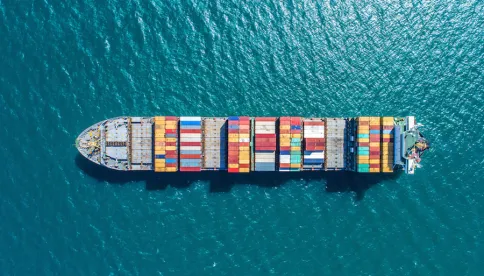CBP Tech Expo Confirms No Existing “Silver Bullet” Technology and CBP Dashboard Reveals Every Industry Is Subject To Forced Labor Detentions.
On March 14-15, 2023, at US Customs and Border Protection’s (CBP) Forced Labor Technical Expo (Expo), “Tools for Supply Chain Transparency,” technology service providers (providers) presented their forced labor supply chain diligence solutions. The Expo confirmed that there is currently no single “Silver Bullet” technology that can eliminate the need for importers to fully trace their supply chains.
The Expo followed a 2021 private session between CBP and forced labor technology service providers and subsequent requests from industry for a public and collaborative technology vetting process.
The providers presented interesting and innovative solutions that can assist with certain aspects of the diligence process, however there is currently no “silver bullet” or single technology solution that can ensure that goods are not sourced in whole or part from the Xinjiang Uyghur Autonomous Region (XUAR), from an entity on the Department of Homeland Security (DHS) Uyghur Forced Labor Prevention Act (UFLPA) entity list, or a supplier subject to a Withhold Release Order. In many cases, multiple technology services would need to be layered to minimize supply chain risk, at a significant cost. While the fees will depend on the importer’s supply chain, several providers have confirmed an annual license or contract fee in the six-figure range. Origin testing technologies are also currently unavailable for most products other than apparel or agricultural products.
While technologies will likely become more sophisticated with time, today risk cannot be completely eliminated because a single software cannot definitively confirm all the suppliers in a supply chain. Assistance with identifying unknown suppliers is key because importers have less visibility regarding suppliers deeper in the supply chain. Thus, third-party technology providers can be used as supplemental tools, but currently nothing can fully replace an importer’s supply chain due diligence program to fully understand the risks within its supply chain.
Technologies
The technology service providers at the 2023 Expo can broadly be grouped into the four categories below. We can provide more details regarding each provider upon request. CBP did not endorse any specific providers and did not specify which technologies are used by the agency for forced labor diligence. However, during independent discussions with technology providers, several have confirmed contracts with CBP.
Supply Chain Mapping Providers: These providers assist companies to map their supply chain using AI, public data and shipping records, or supplier input. (e.g., Kharon, Altana Technologies, Mesur.io, Sourcemap Inc., Everstream Analytics, FRDM, TrusTrace, Assent Inc, Senergy Technical Services (USA) -Solar).
Supply Chain Risk Assessment Providers: Once suppliers are identified, these providers can help assess forced labor risks by detecting links to problematic suppliers identified through entity lists, Withhold Release Orders, Non-Governmental Organization reports, media, etc. (e.g., Kharon, Altana Technologies, Exiger Government Solutions, Deloitte Financial Advisory Services, Sayari Analytics, LLC, Everstream Analytics).
Product Testing and Tracing Providers: These providers conduct DNA or isotopic testing to confirm the origin of products. Historically, this testing has been used to confirm the origin of certain fibers or agricultural goods, however at least one provider is developing solar testing technology. Certain providers trace and authenticate products within the supply chain to confirm the origin of the finished goods and materials. Significantly, CBPs recently issued FAQs advising that test results may be submitted with other supply chain information to confirm no nexus to XUAR, but the test must be specifically connected to the detained shipment. (e.g., Flora Trace Inc., Tailorlux GmbH, Haelixa, Applied DNA Sciences, Inc., Covisus).
Labor Practice Review Providers: These providers audit entities within the supply chain to review whether the factories comply with labor standards and to identify potential signs of forced labor indicators and remediate any problems. Because these providers review labor practices, they may assist with requesting an exception from the Uyghur Forced Labor Prevention Act (UFLPA). However, it is still difficult to audit suppliers in China. (e.g., Verite).
UFPLA Statistics Dashboard
During the Expo, acting CBP Commissioner Troy Miller also announced that the CBP Uyghur Forced Labor Prevention Act Statistics Dashboard is live. The site provides information by industry group (organized by the Centers of Excellence and Expertise) regarding the number and value of shipments targeted for exam; the number of detained, released, and denied shipments; and the origin of the detained merchandise. These statistics have been published in response to industry requests for more transparency regarding the products that have been detained and released.
We highlight some interesting statistics in the Dashboard below:
-
Since the UFLPA took effect in June 2022, 3,237 shipments have been reviewed, with 424 shipments excluded from entry and 1,090 shipments released after further examination (the exam result is still pending for 1,723 shipments).
-
Products from every industry sector, including Agriculture, Apparel Footwear and Textiles, Automotive and Aerospace, Base Metals, Consumer Products and Mass Merchandising, Electronics, Industrial and Manufacturing Materials, Machinery, Pharmaceuticals, Heath and Chemicals have undergone additional forced labor exam, resulting in detentions.
-
The majority of shipments examined by CBP under the UFLPA are in the electronics industry, where a total of 1,627 shipments, valued at $841.23 million, have been examined. Most of these shipments involve solar products. 1,058 shipments are still pending exam results.
-
The apparel, footwear, and textiles (631 shipments valued at $29M) and industrial and manufacturing industries-possibly PVC related (422 shipments valued at $39.06M), respectively, saw the second and third most shipments examined under UFLPA.
-
Direct shipments from China still account for the majority of exams for all industries but electronics. CBP is focusing on shipments of electronics products that originate outside of China, likely because most solar products are manufactured in third countries. Overall, Malaysia and Vietnam accounted for the majority of the shipments that were examined. Importers should review their supply chains to ensure that their China-origin materials manufactured into products in third countries also do not have a nexus to XUAR.
CBP expects to update the statistics on a quarterly basis. We are closely watching how recently published non-governmental agency reports affect future exam and detention statistics.




 />i
/>i

